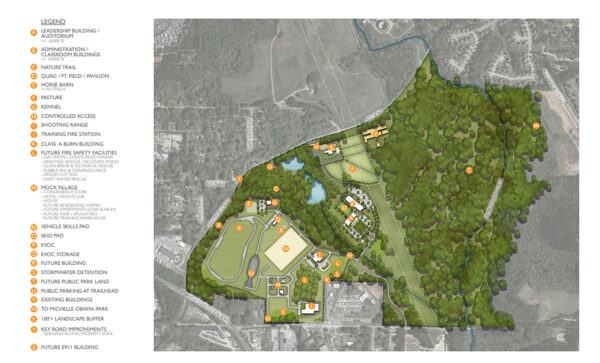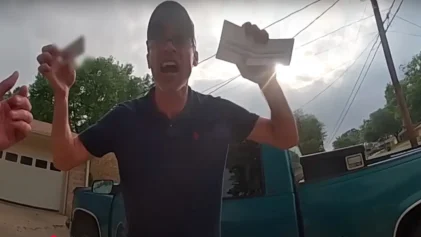A chorus of Morehouse and Spelman students is the latest group protesting the development of Atlanta’s “Cop City.” They fear the training facility for police will produce a hardened, militarized force, and expressed those fears and more during a forum at Morehouse College.
“We are here to discuss a system that is historically and continuously oppressing our community. We are here to address the construction of a mass police training center in Atlanta,” one of the student protesters said to applause.
The protest was in response to Atlanta’s controversial “Cop City,” a $90 million training facility for police, fire and emergency first responders. The facility has drawn a slew of criticism from police reformists and environmentalists since the idea was first proposed in 2015, up to its final approval by the Atlanta City Council in October 2021.
Student protesters have accused Morehouse of supporting the construction of “Cop City,” but some AUC students — with some from Spelman College and Clark Atlanta University, for example, present for the forum — have called on their leadership to denounce the police training center.
Morehouse College junior Calvin Bell III is one student activist opposing the training facility.
“This investment will inevitably be increasing policing, which in my opinion, is not synonymous with protection for communities such as the West End, especially when policing is infested with racist and classist history,” Bell said, referring to the predominantly black area of metropolitan Atlanta.
The youth are not the only ones raising concerns at the HBCU on Atlanta’s Southwest side. Dozens of faculty members signed an open letter to oppose the training facility.
“Let us not delude ourselves: Cop City, if built, will result in more death and destruction at the hands of the police,” the letter says.
Morehouse College political science professor Andrew Douglas has been one of the more outspoken faculty members.
Cop City is the name coined by local residents for the Public Safety Training Center. In 2015, the city tasked the Atlanta Police Foundation with fleshing out details for how much the facility would cost and how it would look.
The facility is slated to cover 85 of 380 acres owned by the city of Atlanta. The property was once a prison farm that has sat largely dormant for years.
“Part of the problem with ‘Cop City’ too is it’s very clearly preparing the police force in a militarized type of way. And I think it calls for shooting ranges, they’re practicing large-scale crowd suppression strategies. You know, this is about bringing military tactics to our cities in our communities,” Douglas said to WXIA-TV in Atlanta.
Supporters of the PSTC come largely from the APF. They claim the new training facility will improve police morale, retention, recruitment and training for Atlanta’s Police Department and Atlanta’s Fire and Rescue.
Atlanta Black Star reached out to APF to address specific concerns from those opposing the project, but our requests were not immediately returned.
APF claims the creation of the training facility will “embrace police reform and cultural sensitivity through an extensive training and educational partnership with the National Center for Civil and Human Rights,” according to its website.

The PSTC will be built in phases with private and public funding. The APF raised money through philanthropic and corporate donations. The City of Atlanta will also contribute $1 million per year for 30 years, based on a lease agreement, beginning in fiscal year 2024 — or a single contribution through a general obligation bond the city says.
PTSC will house several components that police and fire rescue personnel say are needed for adequate training. It will include an emergency vehicle operations course for fire and police driving training. Other features include indoor and outdoor shooting ranges, a kennel for canine training, housing for recruits and classroom space. The facility will also house a mock village to include a gas station, bank, nightclub, school, homes and a park.
According to the city, their first responders will be trained on de-escalation techniques, mental health, community-oriented policing and crisis intervention training and receive a Civil Rights history lesson.
The scale of Atlanta’s training facility is on par with other large U.S. police department facilities.
The City of Chicago unveiled its new $170 million police and fire rescue training facility in January 2023.
The City of Los Angeles approved a 43-acre training facility for the Los Angeles Police Department in the late 1990s that cost the city $30 million to build.
The New York Police Department training facility, the largest in the nation, sits on a 32-acre campus in College Point, Queens New York. It cost $950 million to build.
Georgia Gov. Brian Kemp, Atlanta City Council members and former mayor Keisha Lance Bottoms and current mayor Andre Dickens all have supported PSTC, despite local opposition.
“Our training includes vital areas like de-escalation training techniques, mental health, community-oriented policing, crisis intervention training as well as Civil Rights history, education,” Dickens said according to WABE.
Spelman College president Helene Gayle issued a statement on Feb. 10, acknowledging student concerns regarding PSTC; she also denied that the college is financially supporting the construction of the project.
APF disputes claims the construction of the PSTC will encourage police overreach and aggression. It also rebuffs environmentalists claims the PSTC construction will clear out tree species vital to the environment.
Environmentalists have protested PSTC alongside police reform and social justice activists since before the project was approved. On Jan. 18, protests turned deadly when Manuel Teran, 26, who is white, was shot and killed by a state trooper conducting a sweep of the forest where dozens of protesters frequented. Teran’s shooting is currently under investigation by the Georgia Bureau of Investigation.
Dickens has become a focal point amid the student protests where some students have called him a “sellout,” a claim he rebuffed.
“Let me share this with you, I ain’t never been no sellout. You’ve got the wrong resume you’re looking at,” Dickens said in response to the students.
“You’ve been heard, you’ve been heard but you’ve pulled the wrong resume to pull out the race card. My deck is stacked,” Dickens continued.
As tensions continue to mount surrounding the development of PSTC, its future still looks likely despite a minor setback in mid-February. A motion was filed on Feb. 7 to halt construction by a DeKalb County resident, County Commissioner and the South River Watershed Alliance citing environmental concerns. However, a judge denied the motion on Feb. 18.
As the pathway for PSTC continues to push forward, protesters against its development are not quieting down anytime soon.
“It is vital that we utilize our voices to not only fight against the investment of Cop City but ultimately ensure that Black communities like the West End are cherished and valued,” Bell said.
We will continue to follow this story as it develops.


